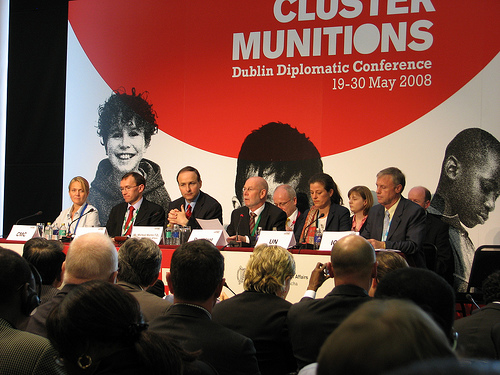Respected Canadian negotiator removed from disarmament talks, resigns
Thu, Feb 10, 2011
Respected Canadian disarmament negotiator Earl Turcotte has been removed from his post following American complaints that his stance on the international Convention on Cluster Munitions was too aggressive. Turcotte has since informed his colleagues that he will be resigning from the Department of Foreign Affairs in order to independently advocate for the Convention, which he helped draft in 2008 (Chris Cobb, “Lead Canadian negotiator dropped from disarmament talks,” Postmedia News, 7 February 2011).
Cluster bombs are “inaccurate and indiscriminate” weapons that scatter hundreds of bomblets over the area they are detonated. These bomblets can remain live for years, making them extremely dangerous for civilians. Sadly, they have maimed and killed a large number of children. The treaty makes cluster munitions illegal according to international law.
Canada has signed the treaty, but parliament has been slow to ratify it due to controversy over its Article 21, which pertains to joint military operations between countries that have ratified the treaty and those that refuse to do so, which include the United States:
Although Canada does not produce, use or stockpile clusters, the sticking point for DND has been its relationship with the United States military and joint operations with U.S. forces in Afghanistan.
The United States, along with other major manufacturers and users of landmines and cluster munitions, refuses to sign the treaty and under the George W. Bush administration actively discouraged allies from doing so. U.S. diplomats say a better option is to develop a cluster weapon that doesn’t leave a residue of unexploded bomblets.
Turcotte’s unhappiness with what he calls in the email “Canadian interpretation of one of the critical elements” of the treaty could be an ominous sign for pro-ban advocacy groups because it seems likely he is referring to the controversial Article 21, a clause he and others on the Canadian negotiating team in Dublin fought for against bitter opposition from advocacy groups.
While the clause was key for countries involved with the United States in Afghanistan and in any future joint operations, it was mutually agreed that any interpretation should be within the spirit of the entire treaty — that joint operations are allowed but only if cluster bombs are not used and are not, in any way, part of the joint military scenario.
Human rights and pro-ban activists have expressed disappointment in the Canadian government for Turcotte’s removal and subsequent resignation:
Mary Wareham, a senior arms advocate with Human Rights Watch in Washington, said diplomats and advocates alike will “miss him dearly” and claimed Turcotte’s removal is symptomatic of “Canada’s recent foreign policy setbacks in multilateral diplomacy and the demise of Canada’s strong moral voice on some key international issues.
“We expect Canada to implement the Convention on Cluster Munitions in a strong manner that is consistent with the goal of the convention,” she said. “And that is to eliminate cluster munitions and the harm they cause to civilians. We hope that Canada’s domestic legislation preserves the absolute and comprehensive prohibitions of the treaty, even during joint military operations with its allies that aren’t party to the treaty.”
– – – – – – – – – – – — – – – –
I SENT COMMENT TO THE WEBSITE:
Lockheed Martin Corp (American military-industrial complex) is/has been a manufacturer of land mines and cluster munitions. They removed most of the evidence of the latter from their website when the International Treaty on Cluster Munitions was signed. Lockheed Martin is influential in the Pentagon (stating it mildly). They are increasingly influential in Canada, with more lobbyists in Ottawa than oil and gas. Through the “Canada First Defence Strategy” (2008) Canadian tax-payers are funding the duplication of the American military-industrial complex in Canada, with Lockheed Martin the key player. We need to extend solidarity and support to Earl Turcotte. Canadian foreign policy is being dictated by Lockheed Martin Corp. “President of the Americas” for Lockheed Martin (that’s his real title) is Ron Covais. The most recent gift to humanity of Lockheed Martin is unmanned drones. (Update, 2015: they were also the number one contract interrogator in the torture at American offshore prisons.)
